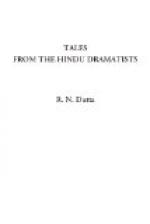Then comes her foster-sister’s clear enigma and tells intelligibly whose her heart is.”
Kalahansa, advancing, shows a picture and says, “This picture is the work of hers who has stolen Madhava’s heart. Mandarika gave it to me. She had it from Lavangika, Malati painted it to amuse and relieve distress.” Makaranda says, “This lovely maid, the soft light of your eyes, assuredly regards you bound to her in love’s alliance. What should prevent your union? Fate and love combined seem labouring to effect it. Come, let me behold the wondrous form that works such change in you. You have the skill. Portray her.”
Madhava, in return, delineates the likeness of Malati on the same tablet and Makaranda writes under it the following impassioned love-stanza,
“Whatever nature loveliness displays,
May seem to others beautiful and bright;
But since these charms have broken upon
my gaze,
They form my life’s sole exquisite
delight.”
Being asked by Makaranda as to how and where Malati first saw Madhava, Mandarika says, “Malati was called to the lattice by Lavangika to look at him as he passed the palace.”
The picture is restored to Mandarika and brought back to Malati.
The mutual passion of the lovers, encouraged by their respective confidants, is naturally increased.
Madhava thus addresses Makaranda,
“It is strange, most strange! wherever I turn, the same loved charms appear on every side. Her beauteous face gleams as brightly as the golden bud of the young lotus. Alas! my friend, this fascination spreads over all my senses. A feverish flame consumes my strength. My heart is all on fire. My mind is tossed with doubt. Every faculty is absorbed in one fond thought.
I cease to be myself or conscious of the thing I am.”
Malati thus addresses Lavangika:—
“Love spreads through every vein like subtlest poison and, like fire that brightens in the breeze, consumes this feeble frame. Resistless fever preys on each fibre. Its fury is fatal. No one can help me. Neither father nor mother nor Lavangika can save me. Life is distasteful to me.
Repeatedly recurring to the anguish of my heart, I lose all fortitude and in my grief become capricious and unjust. Forgive me. Let the full moon blaze in the mighty sky. Let love rage on. Death screens me from his fury.”
In the meantime, the king makes the long-expected demand and the minister Bhurivasu returns the following ambiguous answer:—
“Your Majesty may dispose of your daughter as your Majesty pleases.”
[This answer is used in a double sense:—
“Your minister’s daughter is your own daughter and you can dispose of her as you please,” and “You can dispose of your own daughter as you please, but not my daughter.”
The father’s connivance at his daughter’s stolen marriage would appear inconsistent if the reply is not understood in its double sense.]




